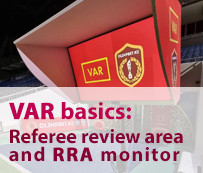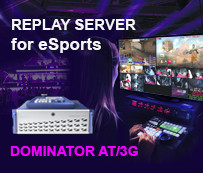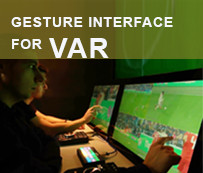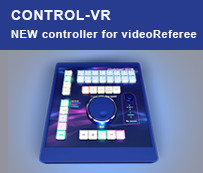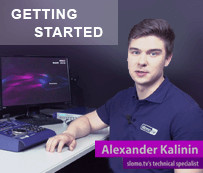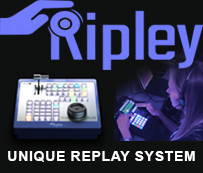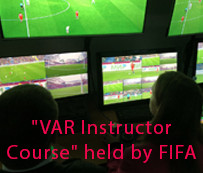Sports competitions and other important events are usually broadcasted live, because people like to watch and follow the events without knowing the final result. They are curious about whether their favorite team will make it to the next stage of the competition, or whether the space launch will be successful. When the outcome is already known, the interest in the event is quickly lost.
The creation of a spectacular broadcast and retention of viewers' attention is the responsibility of a group of creative professionals who need to align their actions with the changing course of an event or sports competition, such as a football or a hockey match.
On air work it means a quick change of focus, strict time limits, and necessity to anticipate the development of a situation. That explains the high requirements for qualification and skills of production directors, cameramen, video engineers and graphics specialists.
For a long time, such people on live broadcasts "were worth their weight in gold". Training of these personnel was long and difficult. Getting practical experience based on theoretical knowledge was possible only on live broadcasts with a small number of viewers and low level of responsibility.
To simplify the training process for TV specialists working at live sporting events, Slomo.tv in 2010 developed the "Academy" system. The "Academy" is a specialized server with a library of clips for training sports production directors, replay operators, and CG specialists. The principle of the "Academy" training is quite simple – to recreate as closely as possible the workflow in a studio or OB Van by using the real footage of events. In fact, the "Academy" is an emulator of a sports competition and cameras that are used for its broadcast.
For the first time this Slomo.tv's training technology was used to train TV personnel for the 2014 Winter Olympics in Sochi.
The "Academy" allows to immerse production directors, technical directors and their assistants, replay operators, CG operators in a real working environment. At the same time, they are not under pressure and are not afraid to make a mistake at the initial stages, because there is an opportunity to try again and work out the whole process. For training, the multi-camera recordings of full matches or playlists with clips are used: for operators – one set of events, and for directors – a different one. This way, participants can train first on easy game situations and gradually move on to more difficult ones. This makes it possible to train staff qualitatively, increase their ability to learn, instill stress resistance, develop basic skills and learn how to work in a team.
Another advantage of the "Academy" is the ability to record the result of each person's work, for example, how a particular moment was handled. The recordings can be analyzed and evaluated; the training instructor or all participants can make suggestions and work out how to show it better.
The main feature of the "Academy" is the ability to train more people in a group setting in a short period of time, as well as to organize training centers. Specially prepared materials, recordings and clips allow the trainees to practice in the real sports competition environment, but without the need to wait 10-20 minutes for a goal or something to happen. This provides the opportunity to intensely and quickly train the staff with guaranteed results.
In addition to training on standard situations, a stress tolerance training is also carried out. The "Academy" can emulate a quick change of important game events, as well as, for example, the loss of the signal from multiple cameras. All participants of the training adapt to handle high-stress situations and will not be confused if something similar happens during a live broadcast. After the training participants become well prepared specialists who are not afraid of working at real competitions and can solve their tasks quickly and accurately.
The "Academy" can also serve as a training simulator for cameramen. During the preparation for the 2014 Winter Olympics, the cameramen were shown recordings from different cameras, and there was a discussion about what angles and camera plans to choose and what to pay attention to.
After the successful use of the system for training sports broadcast professionals, the system has found application in the training of production directors for various shows broadcasted live large-scale events and activities. The TV companies used their recordings and video materials to train future production directors, as well as sound engineers, since the "Academy" allows recording and playing from 64 to 192 audio channels. This allowed the companies to train their own specialists and have a "bench" ready to join the work at any time.
Thus the "Academy" evolved from a system for training personnel in sports broadcasts, to a convenient simulator for training diverse professionals.
The "Academy" is also actively used to coach replay operators and video referees, including Video Assistant Referees in football and Video Goal judges in ice hockey. Like production directors, referees and replay operators work in a high-stress environment, but the price of their mistake is significantly higher, since it can affect the outcome of the entire match, position of the team in the standings and their own career.
Given the fact that the regulations of the competitions indicate all the basic issues in which a video referee is involved in resolving a controversial situation, slomo.tv specialists in agreement with the sports leagues prepared a large library of training materials for video referees (VARs) and replay operators.
Video referees study the issues that require their attention, and learn how to handle them. The replay operators train to control the system in order to quickly show the referees the camera angles of the moments they are interested in. At first, the training is carried out on sets of specially selected moments, each of which represents a certain type of issue. At this stage, referees and replay operators learn all types of standard controversial situations. At the same time, communication and interaction between the referee (VAR) and the operator is practiced. This stage is followed by working with random events and situations where controversial moments go one after another. It helps to improve the stress tolerance and train to quickly make the right decisions, the learned material is consolidated.
The operator's actions are brought to automaticity by learning to prepare the necessary video material in the background without a voice command – based on an understanding of the game and the aspects to which the video referee draws attention. The final training sessions are carried out using the full match records. It is very important that at each stage there is a review and correction of the actions of each trainee.
The "Academy" is not only a quick and easy way to train high-qualified referees and replay operators, but also a great tool for practicing and training during long breaks, for example, between seasons.
An interesting positive effect of the "Academy" is the possibility to organize a "quality loop". The multi-channel videos of new and difficult refereeing errors that occurred during a certain number of matches in the regular season can be sent to the training center and uploaded to the "Academy". Experts and instructors analyze these errors, develop and work out the order of actions in such situations, and then conduct short-term training for practicing referees on these materials. It can help in continuous improvement of the referees qualification of and decrease the number of errors of the same type. The same video materials can be added to the "Academy" library and be included in the training program for the new referees and replay operators.
Summarizing all of the above, the "Academy" is the technology for rapid intensive training of various specialists, video referees, replay operators and is a convenient tool for keeping their skills at a high level.




